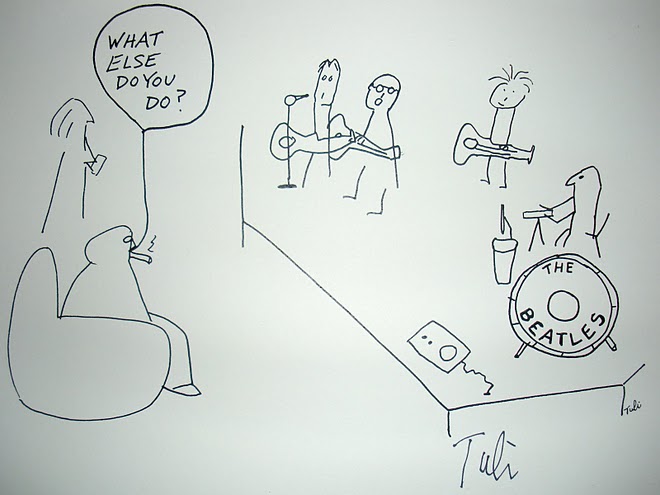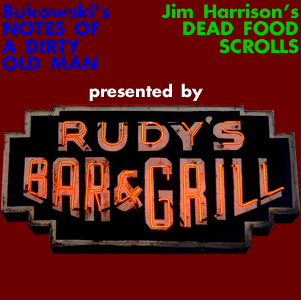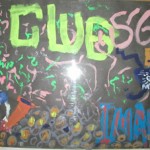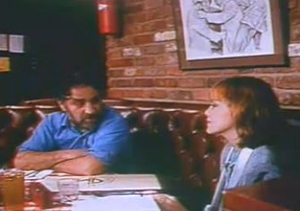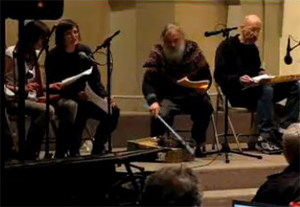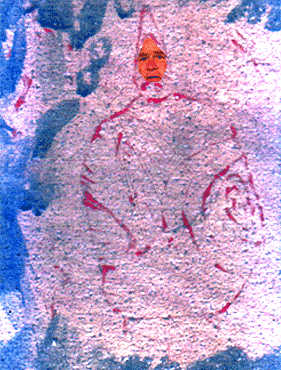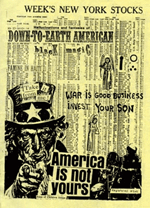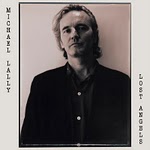FAMOUS LONG AGO REDUX:
Raymond Mungo’s
SILK ROAD MAHABHARATA
Raymond Mungo’s
SILK ROAD MAHABHARATA
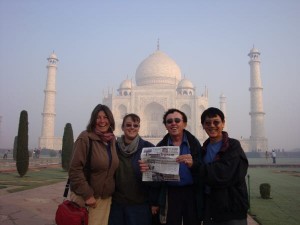
To begin at the end, you just have to follow the road. Sooner or later it forks and winds down the loveliest yellow wood. But I didn’t know that, not consciously, when I set out for a pleasure venture into darkest Cambodia and mother India and you don’t have to go that far to get to the end, I mean beginning, but wait – wait – let me explain.
The concept of traveling at Christmas – not to visit family or friends, indeed to escape them and the awful jingle bell season entirely – came to us in an Arctic inspiration about 20 years earlier and, having once tasted the delicious elixir of Yuletide liberation, we have enjoyed it nearly every year since. There’s no place like no home for the holidays. Try it some time; Christmas in Hong Kong may mean dim sum for breakfast and in Phnom Penh a department store Santa may be depicted fully bloody crucified on a cross.
Most years, however, my husband and I spent the year end holidays in Western cultures – Europe principally, Canada, or parts of the USA distant from our home in California. So while we did not succeed in abandoning the culture of the manger and reindeer entirely, at least we managed to find ourselves strangers in somebody else’s town, invited to no cloying feast and beholden to no guilt orgy of phony generosity.
But in 2008, that benighted year of apocalyptic change and global seizure, we conceived the odd notion of expending the winter holidays in Asia instead – in Hong Kong, Cambodia, and the great unknowable India. Partly this shift reflected boredom with past destinations –how many times can you “revoir” Paris? – a yen for something new, and partly it rose from a primeval urge to return to India, which I had traveled for months in 1971 and ’72 when I was an earnest young seeker of truth, enlightenment, and hashish, one of an army of Western hippie youth which descended on the Indian subcontinent short of funds and flush with naïve energy.
At that time, as I traversed the land in flowing linen blouse and a kind of skirt wrapped about my skinny waist, people said “You are not the typical American – you will return to India some day.” And I thought well, yes, but I’ll probably be an old man over 60, rich, ride first class in the train and stay in a hotel, not a penniless pilgrim. At the time, my last cent was spent in a place called Manigoan, Nepal, pronounced “money gone,” native peoples kept me alive on rice and lentils and I slept on their floors and learned to appreciate the material benefits to which I’d been born and theretofore took for granted.
But that’s another story. Hubby and I set about the happy chore of studying and planning for Cambodia and India, which in ’08 made a pretty distraction from the presidential primary and election campaigns in our native country. Since Hub’s a community college professor, he had many students of Cambodian extraction – their parents fled the Khmer Rouge bloodbath there in the 1970’s and settled en masse in Long Beach – and native Indian students, whose rich parents in Mumbai or Bangalore gladly provided tuition and expenses so little Subhas and his sister Kareenja could get a head start on a college degree from no less than the great University of California governed by muscled movie star Aaah-nold.
Got that? So it made perfect sense, not to mention a generous tax deduction, for him to learn first hand about these countries to assist his credibility and knowledge teaching classes in international business and global marketing, while for me the appeal lay in going back to a place I hated and loved long ago.
Idle tourism turned to profound and lethal fate as you shall read, but we thought of little more than exotic fun, unusual food, perhaps smokeable herbs and photo opportunities. We scoured the public and college libraries for books on Cambodian and Indian culture, politics, history.
Hillary Clinton kind of derailed from her formerly unassailable grasp on the presidential nomination to a younger challenger on “super Tuesday” in February, when my auntie godmother in Massachuetts died and willed me her stock in Walt Disney Productions. (A year and a half later, it’s still mired in probate court.) I turned 62 and signed up for Social Security benefits of $551 a month, my sole income since I hadn’t been able to find a job for two years, the movie option on my first book expired the indie studio ran out of money and effectively went out of business, and the only one of my books still earning royalties went out of print. The monthly SS stipend barely covered the premium on my health insurance and I found myself an old man entirely dependent on my partner’s income from teaching, without savings or security of any kind, facing certain death (for actuarial reasons) in an environment of worldly disintegration. I mean of course that the US economy was on course for a major disaster and we knew it, Hub’s a business professor after all, and couldn’t do a damn thing about it. I got a prescription for legal medical marijuana on the premise of depression and anxiety – California is so compassionate with that. I was depressed when not high, and anxious where the next joint was coming from. The new medicine cured both conditions entirely.
Hub’s an Asian himself, sort of, third generation Japanese American of undiluted Samurai stock and floridly LA cultural upbringing. He grew up thinking he was some kind of blond surfer Adonis, the sort of boy he wanted for himself. He spent his days broiling on the beaches of Malibu and Santa Monica and adorning his little butt with finery financed by Dad’s thriving medical practice in Little Tokyo. But he never saw the real Tokyo until graduate school, and didn’t especially enjoy the life in Japan, where he said someone like himself was treated as slightly retarded, having a purely Japanese face but unable to speak on a level above baby talk.
He never showed much interest in visiting the Far East. Versailles and Venezia were more his style. As a spoiled teenage prince, he talked his parents into sending him to prep school in Grenoble, France, and later graduated from Berkeley with a BA in French and speaking fluent Italian and passable German, Spanish, and Greek. China and India were nowhere on his horizon, but he did enjoy a week in Thailand in 2004 on a school break vacation from a semester teaching in Paris where we had a fifth floor walkup pad in the Marais. And that detour through Bangkok and the Thai countryside convinced him that we could have fun while being intellectually stimulated in an Asian setting.
We also had a friend named Barry, a 70 year old retired teacher from LA now living in Phnom Penh, where he rented a large five bedroom house filled with Cambodian acolytes and taught basic English and computer skills to college kids. Barry never tired of praising the glories of life in Cambodia and promised us unstinting hospitality, so that persuaded us to put Phnom Penh and Angkor Wat (Siem Reap) on the itinerary as a kind of appetizer or opening course enroute to our great final feast of India, which had attracted wide interest in the US for its spectacular economic growth in the late 20th and early 21st centuries. Suddenly every American understood that the customer service representative from his own credit card or other business transaction at home was actually sitting in Bangalore, striving mightily to disguise an Indian accent. Overnight, it seemed, every cheap motel chain in California was owned by someone named Patel. University faculties and medical/dental staffs in Boston or Boise were resplendent with Bengalis. “Slumdog Millionaire” was the surprise hit movie of the year, an “Indian” fairy tale shot by a British director using mostly UK actors.
As the US economy and dollar gradually relinquished its global hegemony, smart schoolchildren knew that India and China were the new, emerging giants of industry and finance. The humiliating and hilarious shoe-throwing incident at Bush’s last appearance in Baghdad perfectly symbolized the sordid decline of American prestige abroad. But the US depression also spread to India in ’08, further diminishing the allure of the dollar as export sales and “outsourcing” declined sharply.
We met “Phnom Penh Barry” through a mutual friend, an elementary school teacher named Virginia for whom Barry had been her first principal and mentor in the teaching field. Ginnie eventually went on to a close friendship with Barry and his lover Todd, a museum curator. And we met Ginnie through an art history professor, Helen, a colleague of Hub’s with whom he had conducted Study Abroad semesters in places like Paris, Florence, and Madrid.
After listening to our eager banter about the upcoming trip, it seemed only natural that Ginnie and Helen would want to join us, and so they did. The Silk Road journeyers doubled to four people, two same sex couples traveling together who could be (and were) perceived in Asia as straight. See, things are not always what they seem.
All this trip planning in the very early months of the year saw us locked into nonrefundable air tickets and other considerable expense before it became obvious that the economy was collapsing faster than expected, so tant mieux, “it’s just as well,” because if we had contemplated this trip in June or July – or black September – we would certainly have stayed home. Barry steered us to his air broker in San Francisco, Asian specialists, where an agent named Suzie (whom I could only imagine as Cantonese) contrived for us an intricate itinerary on carriers large and small from LA to Hong Kong to Phnom Penh to Siem Reap (the Angkor Wat), back through Phnom Penh and Hong Kong to New Delhi, from where we booked trains around the “golden triangle” of northern India, back through Delhi again, then Hong Kong, then LA. All this in two weeks over Christmas and New Year’s at a cost of $2,500 a person, at least a thousand bucks cheaper than the nearest competing bid for that particular route – the Silk Road of our imagination. Add in visas and rail costs, prepaid accommodations, entry passes, vaccination and Valium, and each couple was a good $7,000 into the thing by March 08. Not that we were naïve about the coming, even greater depression; for the first time, we purchased trip cancellation insurance. (And in fact one of our airlines went out of business by November.)
It seemed an innocuous enough undertaking – four middle aged Americans, three of them teachers, on a junket to the far East, booked into hotels classified as “mid-range” by the New York Times and Wall Street Journal, and first class train seats, except on rural trains where second class was the highest available. Thoroughly bourgeois people, wine drinkers, pot smokers, interested in art, culture, and exotic cuisine, out for a good time and escape from family and country over the holidays.
Hah. Hah. Hah.
To be continued…
Raymond Mungo is the author, co-author, or editor of more than a dozen books. He once ran for Governor of the state of Washington on his American Express Card. In his spent youth, he attended Boston University, and served as editor-in-chief of the Boston University News in 1966-67; where he spearheaded draft card burnings and demonstrations against the Vietnam War, and in 1967 co-founded the Liberation News Service (LNS), an alternative news source that split off from College Press Service (CPS) and was the forerunner of not only the underground press circuit but alternative weeklies all over America, courtesy of his classic, Famous Long Ago: My Life and Hard Times with the Liberation News Service. Both the original Food Editor and first Sports Editor of Smoke Signals back in 1980s, Mungo’s back with us again, almost 30-years later, as quick witted and nimble as ever, but of course in a totally different incarnation.



